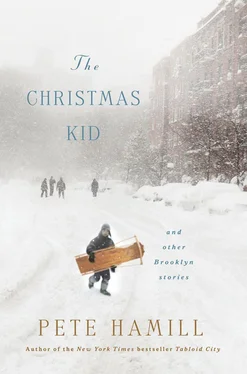“Oh, Mr. Carmody, we thought you got lost.”
“Not in this neighborhood,” he said. And smiled.
“You’ve got a great crowd waiting.”
“Let’s do it.”
“We have water on the lectern, and lots of pens, everything you need.”
As they climbed to the second floor, Carmody took off his hat and gloves and overcoat and the manager handed them to an assistant. He glanced at himself in a mirror, at his tweed jacket and black crewneck sweater. He looked like a writer, all right. Not a cop or a fireman or even a professor. A writer. He saw an area with about a hundred people sitting on folding chairs, penned in by walls of books, and more people in the aisles beyond the shelves and another large group standing at the rear. Yes: a great crowd.
He stood beside the lectern as he was introduced by the manager. He heard the words “one of Brooklyn’s own…” and they sounded strange. He didn’t often think of himself that way, and in signings all over the country that fact was seldom mentioned. This store itself was a sign of a different Brooklyn. Nothing stays the same. Everything changes. There were no bookstores in his Brooklyn. He found his first books in the branch of the public library near where he lived, or in the great main library at Grand Army Plaza. On rainy summer days he spent hours as a boy among their stacks. But the bookstores — where you could buy and own a book — they were down on Pearl Street under the El, or across the river on Fourth Avenue. His mind flashed on Bomba the Jungle Boy at the Giant Cataract. The first book he’d ever finished. How old was I? Eleven. Yes. Eleven. It cost a nickel on Pearl Street.
During the introduction, he peered out at the faces, and they were different, too. Most were in their thirties, lean and intense, or prepared to be critical, or wearing the competitive masks of aspiring writers. About a dozen African Americans were scattered through the seats, with a few standing on the sides. He saw several men with six or seven copies of his books: collectors, looking for autographs to sell on eBay or some fan website. He didn’t see any of the older faces. Those faces still marked by Galway or Sicily or the Ukraine. He didn’t see the pouchy, hooded masks that were worn by men like Seanie Mulrane.
His new novel and five of the older paperbacks were stacked on a table to the left of the lectern. He began to relax. Thinking: It’s another signing. Thinking: I could be in Denver or Houston or Berkeley.
Finally, he began to read, focusing on words printed on pages. His words. His pages. He read from the first chapter, which was always fashioned as a hook. He described his hero being drawn into the mysteries of a grand Manhattan restaurant by an old college pal who was one of the owners, all the while glancing up at the crowd so that he didn’t sound like a professor. The manager was right: it was a great crowd. They listened. They laughed at the hero’s wisecracks. Carmody enjoyed the feedback. He enjoyed the applause, too, when he had finished. And then the manager explained that Carmody would take some questions, and then sign books.
He felt himself tense again. And thought: Why did I run, all those years ago? Why did I do what I did to Molly Mulrane?
I ran to escape, he thought.
That’s why everybody runs. That’s why women run from men. Women have run from me, too. To escape.
People moved in the folding chairs, but Carmody was still. I ran because I felt a rope tightening on my life. Because Molly Mulrane was too nice. Too ordinary. Too safe. I ran because she gave me no choice. She had a script and he didn’t. They would get engaged and he’d get his BA and maybe a teaching job and they’d get married and have kids and maybe move out to Long Island or over to Jersey and then— I ran because I wanted something else. I wanted to be Hemingway in Pamplona or in a café on the Left Bank. I wanted to make a lot of money in the movies, the way Faulkner did or Irwin Shaw, and then retreat to Italy or the south of France. I wanted risk. I didn’t want safety. So I ran. Like a heartless, frightened prick.
The first question came from a bearded man in his forties, the type who wrote nasty book reviews that guaranteed him tenure.
“Do you think if you’d stayed in Brooklyn,” the bearded man asked, “you’d have been a better writer?”
Carmody smiled at the implied insult, the patronizing tone.
“Probably,” he answered. “But you never know these things with any certainty. I might never have become a writer at all. There’s nothing in the Brooklyn air or the Brooklyn water that makes writers, or we’d have a couple of million writers here.…”
A woman in her twenties stood up. “Do you write on a word processor, or longhand, or on a typewriter?”
This was the way it was everywhere, and Carmody relaxed into the familiar. Soon he’d be asked how to get an agent or how he got his ideas and how do I protect my own ideas when I send a manuscript around? Could you read the manuscript of my novel and tell me what’s wrong? The questions came and he answered as politely as possible. He drew people like that, and he knew why: he was a success, and there were thousands of would-be writers who thought there were secret arrangements, private keys, special codes that would open the doors to the alpine slopes of the bestseller lists. He couldn’t tell them that, like life, it was all a lottery.
Then the manager stepped to the microphone and smiled and said that Mr. Carmody would now be signing books. “Because of the large turnout,” the manager said, “Mr. Carmody will not be able to personalize each book. Otherwise many of you would have a very long wait.” Carmody thanked everybody for coming on such a frigid night and there was warm, loud applause. He sat down at the table and sipped from a bottle of Poland Spring water.
He signed the first three books on the title page, and then a woman named Peggy Williams smiled and said, “Could you make an exception? We didn’t go to school together, but we went to the same school twenty years apart. Could you mention that?”
He did, and the line slowed. Someone wanted him to mention the Dodgers. Another, Coney Island. One wanted a stickball reference, although he was too young to ever have played that summer game. There was affection in these people for this place, this neighborhood, which was now their neighborhood. But Carmody began to feel something else in the room, something he could not see.
“You must think you’re hot shit,” said a woman in her fifties. She had daubed rouge on her pale cheeks. “I’ve been in this line almost an hour.”
“I’m sorry,” he said, and tried to be light. “It’s almost as bad as the motor vehicle bureau.”
She didn’t laugh.
“You could just sign the books,” she said. “Leave off the fancy stuff.”
“That’s what some people want,” he said. “The fancy stuff.”
“And you gotta give it to them? Come on.”
He signed his name on the title page and handed it to her, still smiling.
“Wait a minute,” she said, holding the book before him as though it were a summons. “I waited a long time. Put in, ‘For Gerry’—with a G —‘who waited on line for more than an hour.’”
She laughed then, too, and he did what she asked. The next three just wanted signatures, and two just wanted “Merry Christmas,” and then a collector arrived and Carmody signed six first editions. He was weary now, his mind filling with images of Molly Mulrane and Seanie’s face and injuries he had caused so long ago. All out there somewhere. And still the line trailed away from the table into a crowd that, when viewed without his glasses, had become a multicolored smear, like a bookcase.
Читать дальше












